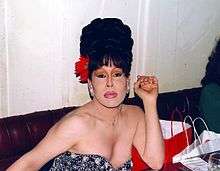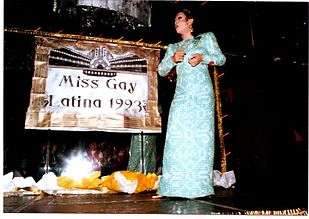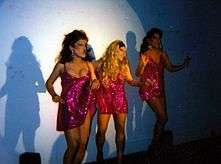Adela Vazquez
| Adela Vazquez | |
|---|---|
 Adela in December of 1991 on Christmas | |
| Born | Camagüey, Cuba |
| Organization | Proyecto ContraSIDA por Vida // Instituto Familiar De La Raza |
| Known for | Transgender activist, Outreach Coordinator at Proyecto ContraSIDA por Vida |
| Home town | Camagüey, Cuba |

Adela Vazquez (born 1958) is a Latin American transgender activist and performer.[1][2][3] Hailing from Cuba during a time of political uprising, Adela Vazquez was one of 125,000 people who sought asylum and migrated in the Mariel Boat lifts in 1980.[1][2] Local to San Francisco’s gay scene, Adela Vazquez began to organize with HIV prevention organization, Proyecto ContraSIDA por Vida and became a community activist towards transgender rights.[4]
Early life
In 1958 Fidel Castro organized the July 26th Movement to overthrow Fulgencio Batista. Adela was born in 1958, and during her birth, homes were burned and cities were destroyed because of the revolution. Adela Vazquez was born out of wedlock and was adopted by her grandfather and grandmother, whom she lived with.
Raised in Camagüey, Cuba, Adela Vazquez spent her childhood walking around downtown and the Casino Campreste. She encountered a large Cuban LGBT community, eventually being baptized as “La Chica Streisandisima” at the swan fountain in Casino Campreste.[5]
Her early involvement with the LGBT community in Camagüey and emigration to the United States was the influence for Jaime Cortez’s graphic novel Sexile.[6]
In Cuba, Vazquez was inducted into the military but was ineligible for service because of her homosexuality. After being denied, Adela committed herself to education and worked toward her teaching degree at Destacamento Pedagogico Manuel Escunze Domenech.
Migration
On April 4 of 1980, Castro's government announced that any Cuban wanting to leave to the United State's was free to go. Castro did this in response to the 5 Cuban peoples who stole a bus and crashed into the Embassy of Peru in Havana, seeking asylum.
Vazquez was one of the people who sought asylum as part of the Mariel Boatlift and emigrated to Florida. Leaving behind family and belongings, Vasquez departed from the port of El Mosquito, a beach she recalled as unsafe and overcrowded. Her experiences on the Mariel boat for eight hours were less positive until she docked at the island of Key West, Monroe County, Florida. [5]
Vazquez was moved to the Cuban refugee center of Fort Chaffee in the city of Fort Smith, Arkansas and recalls being greeted by the Ku Klux Klan that surrounded the center. Spending a month and half there, Vazquez’s experience were generally positive as she recalled the center providing adequate healthcare, churches, and food for refugees.[5]
In 1980, Vazquez was sponsored by the Los Angeles LGBT Center to travel to California. In Los Angeles, she met Rolando Victoria who would become her drag godmother until Victoria’s death in 1982. While in California, Vazquez took jobs as a gift wrapper for Neiman Marcus, a hairdresser, and hotel clerk after she moved in 1983 to the Tenderloin district in San Francisco. [5]
Activism

Adela’s activist work began in 1992 when she was crowned Miss Gay Latina, by Instituto Familiar De La Raza—a community based health and wellness center.[7] Post her crowning, Adela began to organize around transgender rights and issues. She quickly took notice of the large health disparities in the trans community and the need to mobilize. Adela was invited by trans activist Tamara Ching to speak to the issues the trans Latina community faced at the Human Rights Commission at San Francisco's City Hall.[2] Among her many efforts, Adela protested the employment discrimination faced by transpeople and their removal from the workplace because of their gender queerness.


Through her outreach, Adela met a drag queen by the name of La Condonera “The Condom Women,” otherwise known as Hector León.[2][4] Together, Hector and Adela formed a group called Las AtreDivas (a portmanteau of the Spanish word atrevida—daring—and diva), which consisted of four drag queens.[2] Las AtreDivas organized and presented on Spanish language shows at the gay bar Esta Noche, highlighting safer sex practices in order to bring awareness to AIDS and contribute funds for local organizations like Proyecto ContraSIDA.[8] Adela, also known by her drag name "Adela Holyday" was called a “top notch “drag” performer” and an “aesthetic marker” at night clubs.[9][10]

Adela Vazquez was centrally involved with Proyecto ContraSIDA, an HIV prevention organization. Adela volunteered for Proyecto beginning in 1992 and later on became the first trans Latina employee, as their outreach coordinator.[1][2] To combat the AIDS crisis, Adela and Proyecto organized around a multidimensional need to outreach.[4] Adela's work was highlighted in UC Berkeley's Professor Juana María Rodríguez book Queer Latinidad: Identity Practices, Discursive Spaces.[9] In her chapter, "Activism and Identity," Rodríguez highlights the ways Proyecto ContraSIDA offered a dynamic, culturally situated, queer approach to community health.
Adela's community work continued throughout the 1990s. Adela was on a committee of community advisory members for "The Transgender Community Health Project" for the University of San Francisco Department of Public Health.[11]
Adela later on went to serve as a Latino AIDS Education and Prevention Program Coordinator at the Instituto Familiar de la Raza, Inc., a non-proft dedicated to improving the wellness of Latino people in San
Francisco.[12]
Influence and Impact
Diagnosing Difference (Film) - In 2009, Adela starred in a film titled “Diagnosing Difference.” The documentary film highlights the stories of thirteen transgender and genderqueer people and the impact of Gender Identity Disorder (G.I.D). In the film, Director Annalise Ophelian aims to humanize the conversation around Gender variance by featuring people who don’t identify with the gender they were born with, rather than psychologist and psychiatrists leading the conversation. In the film, Adela Vazquez discusses the complexities of gender dysphoria along with the pressure of needing to pass.[3]
“I think ‘passing’ is a word to discriminate us immensely. Not everybody can pass. And passing is something that the doctors will tell you to do, you try to pass. Well, no matter how much I pass, I will never be a biological woman. How about empowering me as the transgender woman that I am?” -- Adela Vazquez
Sexile/Sexilio (Comic): - Sexile/Sexilio is a bilingual graphic novel by Jaime Cortez published in 2004[13] that illustrates the life of Adela Vazquez.[14] Jaime Cortez uses comics to illustrates various moments of Adela Vazquez’s life: her birth, Cuban school life, sexual explorations, Mariel Boat migration, and many others. Sexilio came out of collaboration with Gay Mans Health Crisis. Gay Men’s Health Crisis has been an advocate and leading contributor to HIV/AIDS prevention. Sexilio was nominated as the National Association of Public Libraries’ Queer Book of the Year.[15]
Queer Brown Voices (Book) - Queer Brown Voices: Personal Narratives of Latina/o LGBT Activism, edited by Letitia Gomez, Uriel Quesada, and Salvador Vidal-Ortiz is a collection of fourteen queer Latino Activist personal narratives and their impact on their communities. Adela is the only trans Latina voice in the book.[7]
References
- 1 2 3 Vázquez, Adela. “Finding a Home in Transgender Activism in San Francisco.” In Queer Brown Voices: Personal Narratives of Latina/o LGBT Activism, edited by Uriel Quesada, Letitia Gomez, and Salvador Vidal-Ortiz. Austin: University of Texas Press, 2015.
- 1 2 3 4 5 6 Delgado, Juliana (June 26, 2013). "Cuentamelo: An Oral History of Queer Latin Immigrants in San Francisco". Retrieved April 13, 2016.
- 1 2 Ophelian, Annalise (March 13, 2016). "Diagnosing Difference". Diagnosing Difference. Retrieved March 13, 2016.
- 1 2 3 Rodríguez, Juana María. Queer Latinidad: Identity Practices, Discursive Spaces. New York: NYU Press, 2003.
- 1 2 3 4 Delgado, Juliana (2013-06-26). "Cuentamelo: An Oral History of Queer Latin Immigrants in San Francisco". SF Weekly News.
- ↑ "Sexile - A Graphic Novel Biography of Adela Vazquez". Transas City.
- 1 2 Quesada, Uriel, Letitia Gomez, and Salvador Vidal-Ortiz, eds. Queer Brown Voices: Personal Narratives of Latina/o LGBT Activism. University of Texas Press, 2015.
- ↑ Roque Ramírez, Horacio N. "'Mira, yo soy boricua y estoy aqui': Rafa Negron's Pan Dulce and the queer sonic latinaje of San Francisco."CENTRO: Journal of the Center for Puerto Rican Studies 19.1 (2007): 274-313.
- 1 2 Rodríguez, Juana María. Queer Latinidad: Identity Practices, Discursive Spaces. New York: NYU Press, 2003.http://nyupress.org/books/9780814775509/
- ↑ Roque Ramirez, Horacio. “Mira, Yo Soy Boricua y Estoy Aquí': Rafa Negrón's Pan Dulce and the Queer Sonic Latinaje of San Francisco." Selected Works. N.p., Web. 3 Mar. 2016.
- ↑ "The Transgender Community Health Project". HIV in Site. February 18, 1999. Retrieved April 20, 2016.
- ↑ Sausa, Lydia (July 2009). "Trans & Intersex Resource List" (PDF). Trans Youth. Retrieved April 20, 2016.
- ↑ "Jaime Cortez: Artist, Writer, Friend". sff.org. Retrieved 12 August 2015.
- ↑ "Sexile – A Graphic Novel Biography of Adela Vazquez". Transas City. Retrieved 13 April 2016.
- ↑ "Facing Adversity" (PDF). GMHC 2005 Annual Repor. 2005. Retrieved April 20, 2016.